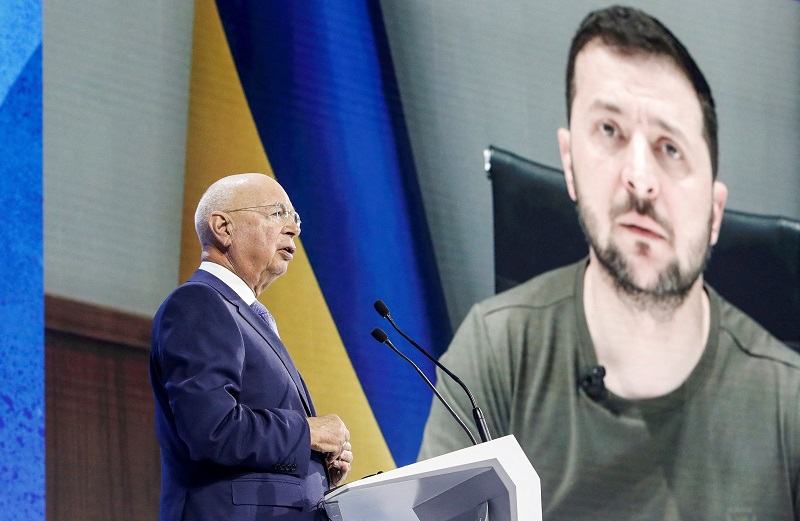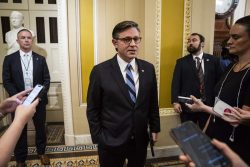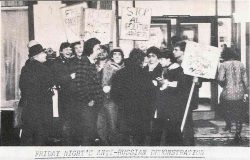
Founder and Executive chairman Klaus Schwab addresses the delegates with the Ukraine’s President Volodymyr Zelenskiy displayed on a screen in the background during the opening ceremony of the World Economic Forum (WEF) in Davos, Switzerland May 23, 2022.
14:07 JST, May 26, 2022
DAVOS, Switzerland – The World Economic Forum is not about confrontation. The gathering of global political elites and leading business executives – putative “masters of the universe” – in this Swiss mountain town has always taken place in a context of comity and solidarity, suffused with appeals to the common good, the progress of man and the cultivation of shared values.
Along the main promenade in Davos, pavilions operated by nation states and multinational firms offer free espressos and sunny corporate messaging about things like eco-tourism and inclusion. Forum attendees were invited to a concert Tuesday evening featuring American cellist Yo-Yo Ma – a performance, the invitation noted, that “celebrates our connection to one another as well as our shared common hopes for a peaceful and prosperous future.”
But the Russian invasion of Ukraine has darkened the atmosphere in Davos, shadowing many of the conversations here and sharpening the mood around what the Forum itself has branded a “turning point” in history.
On Monday, in a virtual address, Ukrainian President Volodymyr Zelensky urged the Forum’s well-heeled executives to scrap their remaining interests in Russia. “All trade with the aggressor should be stopped,” he said. “All foreign business should leave Russia so that your brands are not associated with war crimes. . . . Values must matter.”
The next day, NATO Secretary General Jens Stoltenberg echoed that call. “Freedom is more important than free trade,” he declared, adding that the “protection of our values is more important than for profit.”
For Davos regulars, more accustomed to talking about global interconnectedness than geopolitical ruptures, it’s a strange new world. In the past, noted Financial Times columnist Gideon Rachman, “political leaders – including [China’s] Xi Jinping, [India’s] Narendra Modi and [Russia’s] Vladimir Putin himself – came to pitch to the assembled billionaires. Now the politicians and generals are back in charge – and the business people, who assumed for decades that the whole world was a potential market, are disorientated.”
A current of disquiet is running through the moneyed set. An American investment banker bemoaned the Biden administration’s rushing of billions of dollars in aid to Ukraine, suggesting that would prolong an intractable war and that Ukrainian acquiescence to Russian land grabs would be better for his bottom line. A financier from the Middle East murmured his misapprehension over Western moves to seize the assets of Russian oligarchs in Europe, wondering what precedent it set for other non-Western foreigners with their own investments in the West.
But the precedent that looms above all other discussions is Russia’s unprovoked invasion of Ukraine and the apparent campaign of atrocities left in its wake over the past three months. “Rules of warfare are totally lost, general conventions not respected,” said Finnish Foreign Minister Pekka Haavisto, detailing during a panel session the documented reports of rape, murder and other abuses carried out by the Russian military. “We have to wake up for this situation.”
“Justice is on the side of Ukraine,” Polish President Andrzej Duda said at the same session. “Honesty is on the side of Ukraine.”
A delegation of Ukrainian politicians has provided a kind of moral energy to the Forum. As their country smolders in war, they have gone around, event to event, conveying to the Davos crowd the overwhelming Ukrainian sacrifice over the past three months of war – and the overwhelming Ukrainian need for more advanced weaponry. Talk of liberal values, rule of law and human rights, they contend, must come with a guarantee of hard power and military aid.
“Those living in liberal democracies have started taking for granted the freedoms, values, prosperity and all the accompanying things” that shape their open societies, Ivanna Klympush-Tsintsadze, a Ukrainian parliamentarian, told me. “Ukrainians right now are fighting for the ability to have the right to transform their country according to those liberal norms.”
Yet in Davos, some prominent figures are less impressed. Henry Kissinger, the venerable U.S. statesman, said Ukraine should surrender territory to Russia in order for hostilities to end and that he hoped the West would not get swept up “in the mood of the moment.”
Klympush-Tsintsadze said there was no immediate prospect for negotiations or concessions to Putin’s Russia. “It’s impossible to conduct a productive dialogue with people who have come to just kill you and you want to survive,” she said. “There’s little room for compromise between these two positions.”
Ukraine’s well-wishers recognize that the current wave of support in the West for the government in Kyiv may not last. “I think it’s fairly obvious that the Russian plan is to grind it out . . . and to count on the West to come apart in some way and frankly to lose interest and be distracted by high energy costs and our own elections,” Sen. Christopher A. Coons, D-Del., told me.
“There will be a tipping point in Europe and the U.S.,” said Alexander Stubb, a former prime minister of Finland, “when it goes from solidarity and support” to a kind of “war fatigue.” The combination of low growth, inflation and high fuel and food prices may weigh heavily on populations around the world, which may mean that “element of global sympathy is going to wane a bit,” Stubb told me.
Klympush-Tsintsadze expressed disappointment in the lack of solidarity shown for Ukraine by countries further afield, including democracies in South Asia and Africa. The Ukrainian struggle, she said, is a battle against an imperial power in Moscow, a war of “anti-colonialism that should resonate” in nations that emerged from the Western colonial yoke over the past century.
Facing the European Union, Klympush-Tsintsadze hoped that countries in the continental bloc would make a positive decision soon to give Ukraine “candidate status” to eventually join the European Union. That seems a long shot, with a number of European countries opposed to enlarging the bloc and wary of fast-tracking Ukraine.
Placing Ukraine on the path to E.U. membership, Klympush-Tsintsadze said, would make Russia, which questions her country’s very right to exist, “understand that Ukraine is part of another civilization.”
Ukraine’s soldiers “are not fighting exclusively for their soil,” but the hope of extending Europe’s liberal project to their country, she added. “Ukrainians have to be given a ray of light at the end of the tunnel.”
Top Articles in News Services
-

Prudential Life Expected to Face Inspection over Fraud
-

Hong Kong Ex-Publisher Jimmy Lai’s Sentence Raises International Outcry as China Defends It
-

Japan’s Nikkei Stock Average Touches 58,000 as Yen, Jgbs Rally on Election Fallout (UPDATE 1)
-

Trump Names Former Federal Reserve Governor Warsh as the Next Fed Chair, Replacing Powell
-

Suzuki Overtakes Nissan as Japan’s Third‑Largest Automaker in 2025
JN ACCESS RANKING
-

Japan Institute to Use Domestic Commercial Optical Lattice Clock to Set Japan Standard Time
-

Israeli Ambassador to Japan Speaks about Japan’s Role in the Reconstruction of Gaza
-

Man Infected with Measles May Have Come in Contact with Many People in Tokyo, Went to Store, Restaurant Around When Symptoms Emerged
-

China Eyes Rare Earth Foothold in Malaysia to Maintain Dominance, Counter Japan, U.S.
-

Prudential Life Insurance Plans to Fully Compensate for Damages Caused by Fraudulent Actions Without Waiting for Third-Party Committee Review
























